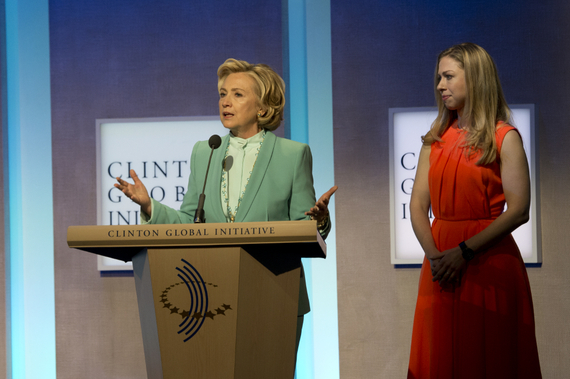Reflecting on the completion of our Clinton Global Initiative commitment to save elephants, I realize how privileged I was in 2013 to participate in two seminal meetings in New York City that helped to frame the future direction of this global movement to make sure there is a future in the wild for these incredible creatures.
It had been a year of mourning for elephants, being slaughtered at the rate of 35,000 a year (96 per day) to meet soaring demand for ivory globally. Earlier that spring, a team of researchers led by my WCS colleagues Samantha Strindberg and Fiona Maisels had published their finding that well over 60 percent of Africa's forest elephants had been killed since 2002.
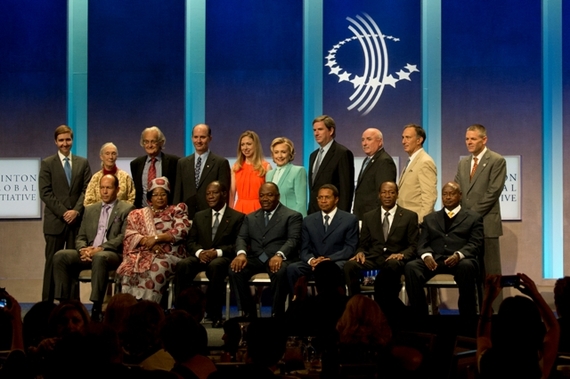
In September 2013, eleven African leaders came together at a meeting of the Clinton Global Initiative to declare that the world must stop selling ivory and close their domestic ivory markets. Credit: Julie Larsen Maher/WCS.
In July of 2013, WCS worked with Secretary Clinton to call together the largest and most active conservation NGOs working to protect elephants to confront the burgeoning crisis of ivory poaching. As we sat together at the Central Park Zoo thinking through our strategy none of us could have imagined that two months later, at the urging of Hillary, Bill, and Chelsea Clinton, eleven African leaders would powerfully declare that the world must stop selling ivory and close their domestic ivory markets.
Out of that meeting an $80 million commitment took shape in the form of the nascent Clinton Global Initiative Elephant Action Network, whose goal would be to stop the killing, stop the trafficking, and stop the demand for elephant ivory.
Reducing the killing required significant funding for greater enforcement and the development of more aggressive and sophisticated elephant poaching detection tools and protocols. Tackling demand required no less than a shift in long-held cultural attitudes and perceptions of the true scope of the crisis taking place in Africa. In the three years since the CGI commitment was made, great progress has been made on each of those fronts.
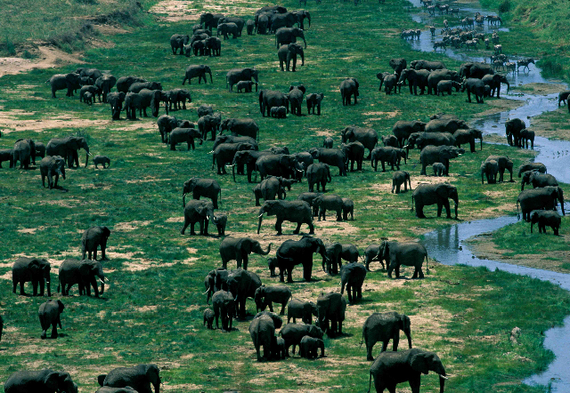
Across Africa today, elephants are being slaughtered at the rate of up to 35,000 a year -- 96 per day -- to meet soaring demand for ivory globally. Credit: Charles Foley/WCS.
Trafficking interdiction efforts have been expanded both at airports and seaports in Africa and at their destination points. Dogs trained to sniff out the presence of ivory have been a growing asset, as have so-called SMART enforcement systems that use mobile technology to track both wildlife and poachers. Meanwhile, a series of campaigns targeting in-country social media have had an impact on public opinion in China -- the world's largest ivory market.
As those efforts proceeded abroad, WCS drew up a particular set of goals to address trafficking in ivory in the United States, where is found one of the world's largest ivory markets outside of China. If US-based institutions of government and civil society were going to be asking other nations to clean up their act, we would have to do the same.
Out of this essential focus, a coalition called 96 Elephants was born. Named for the number of elephants killed daily in Africa, this group would grow in the next three years to a campaign engaging more than 200 organizations in 45 states working to end the illegal wildlife trade in the United States and globally. Our goal would be to secure a U.S. federal ivory ban and pass bans on ivory sales within U.S. states with the greatest trade in ivory, starting with New York metropolitan region - the heart of the U.S. ivory market.
Hillary and Chelsea Clinton speak at the launch of the Elephant Action Network at the 2013 meetings of the Clinton Global Initiative. Credit: Julie Larsen Maher/WCS.
The first thing we did was to poll New Yorkers. We found that more than 80 percent supported a ban on the sale of ivory, finding it immoral and reprehensible. New York set the standard. On World Elephant Day in 2014, Governor Cuomo signed the New York ban into law - in large part due to effort of hundreds of thousands of individuals and passionate advocates like Katie Lee and piano man Billy Joel, whose outreach to elected leaders and Gov. Cuomo proved critical.
California, the nation's 2nd largest ivory market, passed a similar bill in 2015. And just a few months ago, Hawaii - with the 3rd largest market - passed a wildlife trade ban protecting elephants. These laws have been matched by an impressive focus on enforcement at the local level. Just last month, I joined Manhattan D.A. Cyrus Vance and New York State DEC Commissioner Basic Seggos to announce the New York's largest ever seizure of illegal ivory, with a value of $4.5 million.
President Obama and the administration have played a key role in helping to stop this devastating trade though the recently enacted federal ivory ban, foreign diplomacy, and efforts to align a whole-of-government approach. And as a matter of fact, the Chinese government has recently publicly stated that they too will be closing their ivory markets.
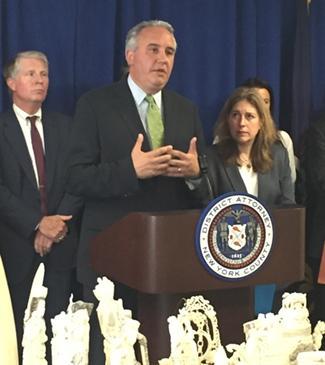
WCS Exec VP for Public Affairs and 96 Elephants Director John Calvelli joins Manhattan DA Cyrus Vance, Jr. in September 2016 to announce the largest seizure of illegal ivory in New York state history, valued at $4.5 million. Credit: John Delaney/WCS.
And at the just-completed CoP 17 of the Convention on International Trade in Endangered Species of Wild Fauna and Flora (CITES), parties adopted a resolution calling for the closure of global domestic ivory markets - adding further weight to a similar resolution passed in September at the quadrennial meeting of the International Union for Conservation of Nature (IUCN).
In the three years since the Clinton Global Initiative helped to launch the Elephant Action Network we have gained valuable insights. As CGI winds down this year, it is important to reflect on some key takeaways for the benefit of similarly ambitious conservation efforts that can and must continue for the protection of wildlife and wild places.
One of the most critical ideas that has come out of work by both the network and the 96 Elephants campaign is the importance of partnerships. We are always stronger when like-minded leaders and institutions - public, private, and non-profit - come together as one to achieve their goals.
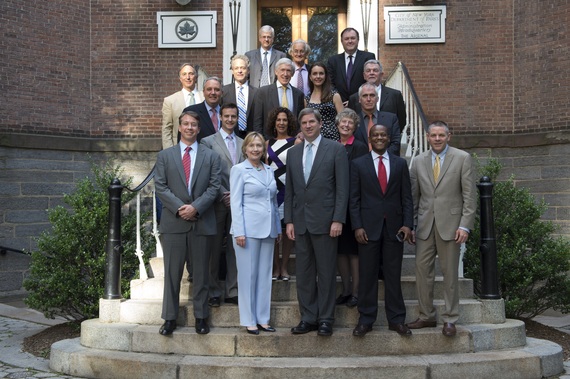
In July 2013, the Wildlife Conservation Society worked with Secretary Clinton to gather at WCS's Central Park Zoo the largest and most active conservation NGOs working to protect elephants to confront the burgeoning crisis of ivory poaching. Credit: Julie Larsen Maher/WCS.
On the trafficking side - perhaps the most complex challenge of the three pillars embraced by the network - we now have a deeper appreciation for the importance of coordinating ivory enforcement efforts and the role of intelligence gathering.
Finally, we must never lose hope. Our efforts have proven that smart interventions can work to protect elephants and other threatened wildlife. At sites in Congo, Chad, and Kenya for instance, elephant populations are stable or increasing because people and organizations are working together to conserve these magnificent animals and their increasingly encroached upon habitat.
All participants in the Elephant Action Network have been privileged and fortunate to work in collaboration with Hillary, Bill, and Chelsea Clinton and the Clinton Global Initiative, whose commitment to the conservation of wild species and their ecosystems cannot be overstated. We thank them for their guidance and dedication.
And if they could give voice in appreciation for the work to ensure their persistence on this planet, the elephants would surely thank them, too.

